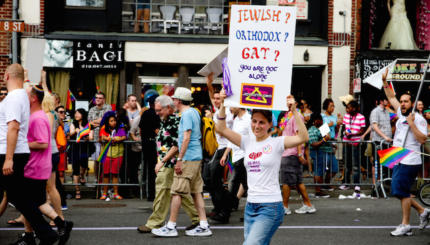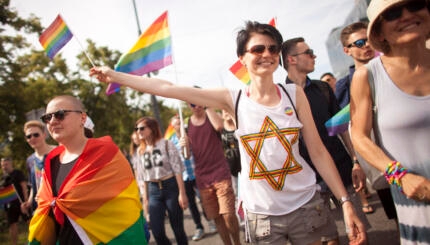Last , the guest speaker at my congregation, B’nai Israel in Bridgeport, CT, was Rabbi Andrea Myers, author of a wonderful memoir entitled, ‘The Choosing: A Rabbi’s Journey from Silent Nights to High Holy Days.” Through insightful, and often highly amusing, personal stories, Rabbi Myers chronicles her own journeying from a Long Island home with a Lutheran father and Sicilian Catholic mother, to Brandeis University, coming out as a lesbian, traveling to Israel and converting to Judaism, and then returning to the USA to become a Rabbi, a wife, and a mother.
There are many layers to the stories that Rabbi Myers tell – in each chapter of her book we learn something about Jewish practice, something about inter-family interfaith relations, and a lot about the spiritual journey that can unfold for each and every one of us as we find the courage to become more of who we truly are.
Prior to her after-dinner presentation, Rabbi Myers also spoke during our Shabbat service, sharing words based on a piece that she wrote for The Huffington Post some months back entitled, ‘It Gets Beautiful.’ Our suburban middle-of-the-road congregation loved getting to know Rabbi Myers. We pride ourselves on being open, welcoming, and inclusive, but nevertheless I was struck by how everyone present responded to the bigger message – become more of who you truly are – told through the lens of this Rabbi who is a Jew-by-choice and a lesbian. Even ten years ago in a Reform congregation, such a presentation which today reflects some centrally held values of inclusivity and the affirmation of sexual and gender expression found in the Reform movement, would have been seen as much more radical.
The evolving understanding that GLBT Jews can live full and visible lives as Jews loving the people that they love is something that is no longer found in just one or two of the most liberal Jewish denominations. In 2006, the Conservative movement voted to permit the ordination of gay and lesbian Rabbis and the celebration of same-sex commitment ceremonies. Back in November of 2011, Rabbi Steve Greenberg, an Orthodox gay Rabbi, officiated at a same-sex wedding.
In the UK this past week, there has been widespread reaction to a controversial story reported in the Jewish Chronicle that a power-point lesson about sexuality at the Jewish Free School in London ended with a slide that some students interpreted as an endorsement of the organization, Jonah (Jews offering new alternatives to homosexuality). While the school, under the auspices of the United Synagogue (the majority Modern Orthodox movement in the UK) has denied any such endorsement, the story has sparked thoughtful conversations that indicate that, in today’s world, there are many young Orthodox-affiliated Jews who no longer regard traditional Jewish observance as a barrier to living a life true to one’s sexual orientation.
The UK Jewish Chronicle also reported on January 19 that the Amsterdam Orthodox community has suspended their Chief Rabbi, Aryeh Ralbag, who is US-based but travels several times a year to serve the Dutch community. This action was taken in response to Rabbi Ralbag signing a declaration, along with 180 other Orthodox Rabbis, psychotherapists and educators, that homosexuality is not an acceptable lifestyle. Ronnie Eisenmann, the lay head of the Dutch community was quoted in the JC, saying: “homosexuals are welcomed and all Jewish couples are accepted as full members so long as they are recognized as ‘couples’ under Dutch law.”
These recent events demonstrate that, as we continue to evolve in our understanding of human sexuality and move toward a place where civil rights are not given or withheld on the basis of sexual orientation, Jews of all denominations are engaging with these questions in new ways that challenge the boundaries for some within our communities. As they do so, many draw on Jewish wisdom and values to reframe the conversation; no longer the language of
toevah
(abomination) found in Leviticus 18:22, but the language of b’tzelem elohim (made in the likeness of God) or lo tov heyot ha’adam levado (it is not good for a human being to be alone). These conversations require us to consider whether religious truths must be defined by their unchanging nature, or whether, as Rabbi Andrea Myers suggests, truly becoming more of who you really are requires a kind of truth that can evolve with us as we, as individuals and as Jewish communities, continue on our journeys.



